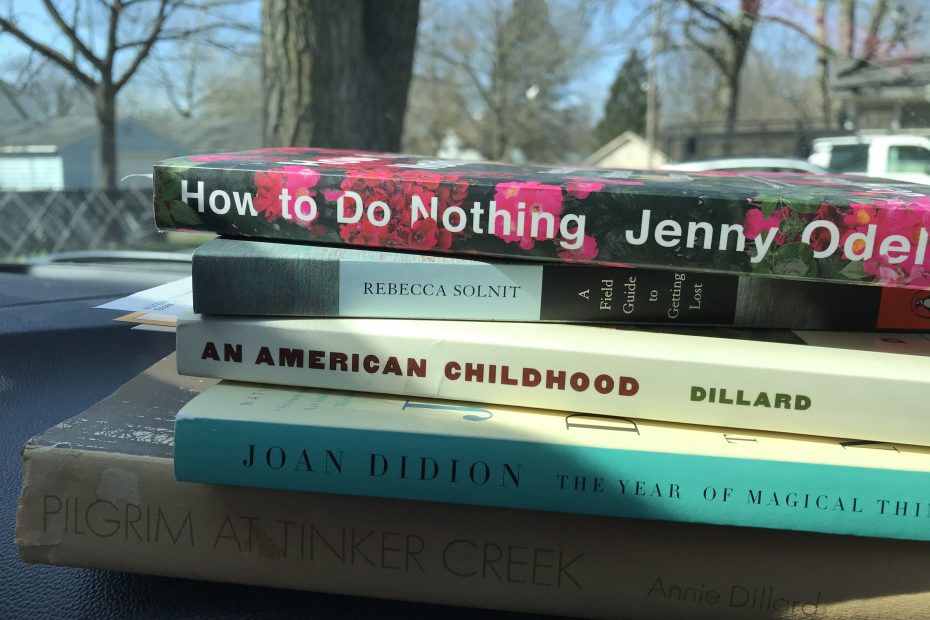For our scholarly identity project for TE 902 (a required seminar course for first year students in MSU’s Curriculum, Instruction and Teacher Education program), I decided to work on a professional website, karahaas.org. I took the concept of scholarly identity literally and decided that my time might be best spent creating a digital space to be able to share my views and work now and in the future. I think I have fallen short of fully explaining my scholarly identity, mainly because it is still unclear to me, but I now have a platform on which to share it as it comes into focus.
I’m still pondering: What is a scholar? Who am I as a scholar? Where do I fit in today’s scholarship?
I’ve learned a lot this semester from our readings, class discussions and assignments. The scholarly interview was more meaningful to me than I had anticipated. For the interview I reached out to Dr. Lissy Goralnik, who teaches undergraduate courses on environmental education and community engagement within the Community Sustainability Department at MSU. I’ve known Lissy for a while and we’ve collaborated on a couple art/science grant proposals. However, I had never taken the time to read any of her scholarship. Before meeting to interview Lissy, I chose to read one of her dissertation chapters, OTTER DANCE: an autoethnography (2015). Autoethnographies are by design deeply personal and allow researchers to “systematically analyze personal experience in order to understand cultural experience” (Ellis, et al., 2010). It was amazing to have this glimpse into Lissy’s life and scholarship and then be able to talk with her. A very important part of our conversation was when I asked Lissy who I should be reading. I asked, “Whose scholarship is important?” In response she paused and then said, “Read something unexpected…Seek people’s stories.” She shared that some of the most important reading for her were books where the authors were synthesizing life. She recommended the works of Kathleen Dean Moore, Annie Dillard, Rebecca Solnit, Joan Didion, Nel Noddings and Robin Wall Kimmerer. Many of these authors I’d heard of over the years but didn’t have their books in my library – a trip to my local bookstores the following weekend helped to solve that problem. My summer reading list just got a lot longer (see below for a curated list of Lissy’s ‘non-scholarly’ suggested readings)! In my interaction with Lissy I learned that reading is important but choose wisely whose voice you want to listen to.
Let’s return to my questions: What is a scholar? Who am I as a scholar? My talk with Lissy reminded me that scholarship can be personal and passionate. On my new website I have tried to share who I am, particularly on my Bio page but also through the Posts that I’ve written. I hope that my passion for science education and place-based learning in nature come through in the Projects that I’ve highlighted.
Finally, Where do I fit in today’s scholarship? I don’t know. I know that science education research has elements that are important to me such as supporting teachers and students in understanding and connecting to the natural world. I think it is important to work to create meaningful opportunities for community-engaged learning related to social and ecological justice issues. I’ve learned that centering social justice is imperative to building an equitable education system (Kavanagh and Danielson, 2020, Calbrese Barton, Tan and Birmingham, 2020, Schiera, 2020). I also continue to think about teaching as a profession, with a career-long continuum of learning possibilities (Feiman-Nemser, 2001). Who I am as a scholar and where I ‘fit’ in today’s scholarship are tough questions that I don’t have meaningful answers for yet. Luckily, I have 4 more years of this PhD thing to work on my scholarly interests and identity.
Lissy Goralnik’s ‘non-scholarly’ suggested reading & listening list (when possible support your local bookstore when purchasing):
Didion, J. (2007). The Year of Magical Thinking (Reprint ed.). Knopf Doubleday Publishing Group.
Dillard, A. (1974). Pilgrim at Tinker Creek. Harper’s Magazine Press.
Dillard, A. (1989). An American Childhood (1st Edition). Harper & Row Publishers.
Dillard, A. (1992). Teaching A Stone To Talk. HarperPerrenial.
Kimmerer, R. W. (2013). Braiding sweetgrass. First edition. Minneapolis, Minnesota: Milkweed Editions.
Moore, K. D. (2005). The Pine Island Paradox: Making Connections in a Disconnected World (The World As Home) (First Trade Paper ed.). Milkweed Editions.
Noddings, N. (2005). The Challenge to Care in Schools: An Alternative Approach to Education, Second Edition (Advances in Contemporary Educational Thought Series) (2nd ed.). Teachers College Press.
Solnit, R. (2006). A Field Guide to Getting Lost (Reprint ed.). Penguin Books.
Tippett, K. (Host). (2016, February 25). Robin Wall Kimmerer The Intelligence of Plants [Audio podcast episode]. In On Being. The On Being Project. https://onbeing.org/programs/robin-wall-kimmerer-the-intelligence-of-plants/
Resources
Calabrese Barton, A., Tan, E., & Birmingham, D. J. (2020). Rethinking high-leverage practices in justice-oriented ways. Journal of Teacher Education, 70, 477-494.
Ellis, Carolyn; Adams, Tony E. & Bochner, Arthur P. (2010). Autoethnography: An Overview [40 paragraphs]. Forum Qualitative Sozialforschung / Forum: Qualitative Social Research, 12(1), Art. 10, http://nbn-resolving.de/urn:nbn:de:0114-fqs1101108.
Feiman-Nemser, S. (2001). From preparation to practice: Designing a continuum to strengthen and sustain teaching. Teachers College Record, 103, 1013-1055.
Goralnik, L. OTTER DANCE: an autoethnography, ISLE: Interdisciplinary Studies in Literature and Environment, Volume 22, Issue 3, Summer 2015, Pages 647–665, https://doi.org/10.1093/isle/isv046
Kavanagh, S. S., & Danielson, K. A. (2020). Practicing justice, justifying practice: Toward critical practice teacher education. American Educational Research Journal, 57, 69-105.
Kimmerer, R. W. (2013). Braiding sweetgrass. First edition. Minneapolis, Minnesota: Milkweed Editions.
Schiera, A. J. (2020). Seeking convergence and surfacing tensions between social justice and core practices: Re-presenting teacher education as a community of praxis. Journal of Teacher Education. Advance online publication.
